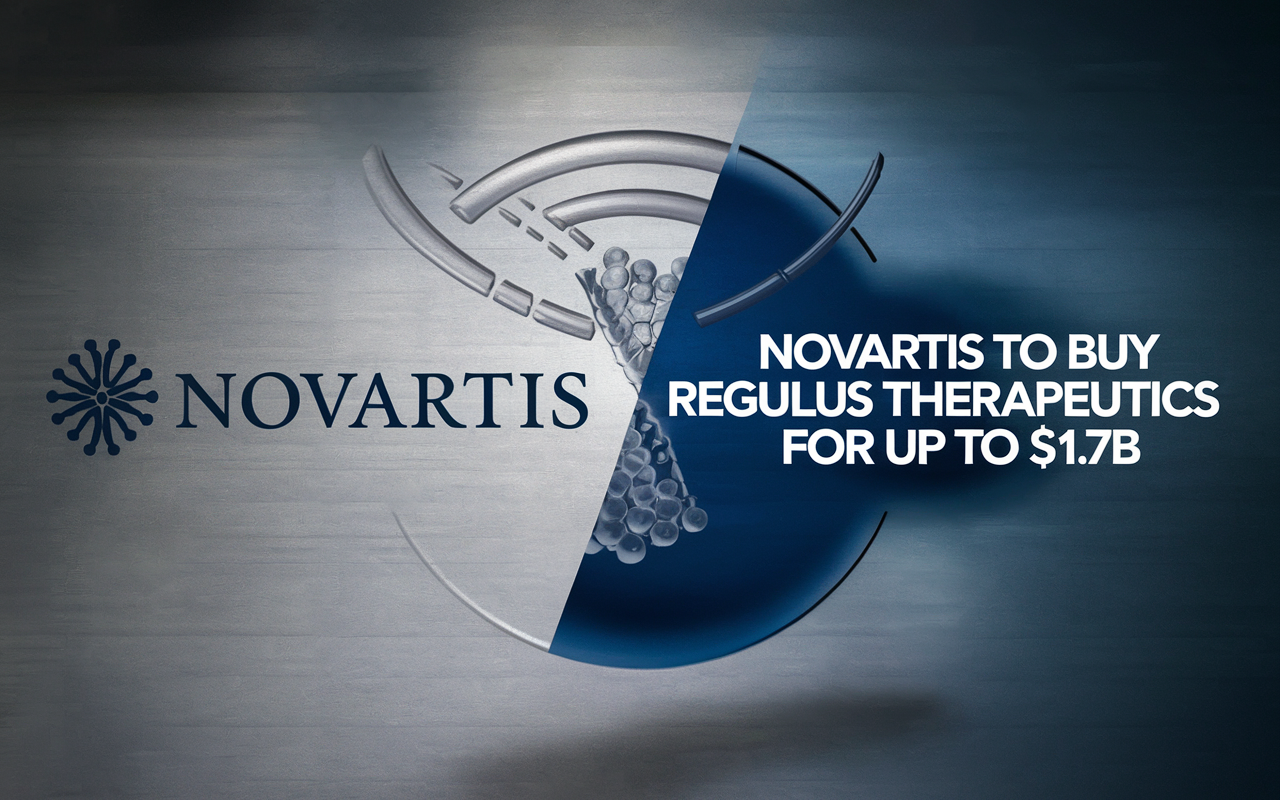Greetings, BioPharmaPulse Enthusiasts
Welcome to another edition of BioPharmaPulse, where we delve into the latest breakthroughs and developments shaping the biopharmaceutical landscape. This issue is packed with insights on industry-defining acquisitions, groundbreaking approvals, and transformative shifts in research methodologies.
What's in this issue:
-
💰 Novartis's strategic acquisition targeting kidney disease innovation
-
🛡️ J&J's new contender in the myasthenia gravis treatment arena
-
🧪 NIH's pioneering move towards reducing animal testing in research
-
❤️ BridgeBio's heart drug exceeding expectations and its impact on cardiology
Quote of the Day
"Innovation distinguishes between a leader and a follower." – Steve Jobs
Latest Developments
💰 Novartis to Buy Regulus Therapeutics for Up to $1.7B (2 minute read)

Rundown: Novartis announced plans to acquire Regulus Therapeutics, a specialist in microRNA therapies, for an upfront payment of $800 million. This move aims to bolster Novartis's portfolio with Regulus's experimental kidney drug, potentially addressing unmet needs in kidney disease treatment.
Key Points
- 💡 The acquisition includes a potential additional $900 million upon achieving regulatory milestones.
- 🧬 Regulus's focus on microRNA technology represents a novel approach to kidney disease.
- 📈 The deal offers optimism to biotech investors in a challenging market.
- 🌐 Strengthens Novartis's position in renal therapeutics globally.
Why it matters: This acquisition underscores the growing interest in innovative treatments for kidney diseases and demonstrates confidence in microRNA-based therapies. It signals potential advancements in patient care and a strategic expansion for Novartis in a competitive field.
🛡️ J&J Secures FDA Approval for Immune Drug Imaavy (2 minute read)

Rundown: Johnson & Johnson received FDA approval for Imaavy (nipocalimab) as a treatment for generalized myasthenia gravis, a rare autoimmune disorder. Imaavy is expected to compete with existing therapies from argenx and UCB, offering a new option for patients with this debilitating condition.
Key Points
- 🆕 Imaavy is an FcRn blocker targeting autoimmune pathways.
- 💪 Provides a new therapeutic option for patients with limited treatments.
- 🏆 Positions J&J as a strong competitor in the myasthenia gravis market.
- 🌟 Potential to become a blockbuster drug with significant sales projections.
Why it matters: The approval of Imaavy expands treatment choices for myasthenia gravis patients, potentially improving quality of life. It also highlights J&J's commitment to innovation in immunology and could drive further research in autoimmune diseases.
🧪 NIH Plans to Reduce Animal Testing in Federally Funded Research (2 minute read)

Rundown: The National Institutes of Health announced a significant shift towards reducing reliance on animal models in research. The NIH aims to invest in human-based alternatives and establish a new office dedicated to developing and promoting non-animal research methods.
Key Points
- 🧪 Focus on validating and scaling non-animal research approaches.
- 🌐 Establishment of an agency-wide office for oversight and coordination.
- 🎯 Aims to make alternative methods more accessible to researchers.
- 🚀 Marks a new era of innovation in biomedical research.
Why it matters: This initiative could accelerate the development of more relevant human-based research models, potentially improving the efficiency and ethical considerations of biomedical research. It signals a transformative approach that may lead to faster, more accurate scientific discoveries benefiting patient care.
Question of the Day
🧐 How do you feel about the NIH's move to reduce animal testing in research?
Trending
❤️ BridgeBio's ATTR-CM Med Attruby Crushes Analysts' Early Expectations
- BridgeBio's heart failure drug Attruby has exceeded sales forecasts since its December launch, indicating strong market adoption and potential shifts in cardiology treatment paradigms.
🌍 Sanofi Nets €10B from Opella Sale, Eyes More 'Bolt-On' Deals
- Sanofi's significant cash influx from selling a stake in its consumer health business positions the company for potential strategic acquisitions and investments in innovation.
🧬 BeiGene Gets Key Win in Patent Spat Over Brukinsa
- BeiGene scored a victory in a patent dispute, clearing a path for Brukinsa in the competitive market for cancer treatments, which could benefit patients with more options.
Industry Insight
🔬 The Rise of MicroRNA Therapies in Treating Diseases
MicroRNA (miRNA) therapies are emerging as a promising area in disease treatment, targeting genetic regulators within cells. These small RNA molecules can modulate gene expression, offering a novel approach to diseases like kidney disorders, as seen with Regulus Therapeutics' developments.
By understanding and manipulating miRNAs, researchers can potentially silence disease-causing genes or activate protective ones. This precision opens doors to treating conditions previously considered challenging. The recent interest from major pharma players underscores the transformative potential of miRNA therapies in the future of medicine.
Quick Hits
📉 Immunic's Stock Falls on Multiple Sclerosis Data (2 minute read)
- Immunic reported mixed results in a phase 2 trial for its MS drug, missing the primary endpoint but noting positive secondary measures, leading to a cautious outlook among investors.
🔍 Cellectar Seeking Strategic Alternatives, Sinking Stock (2 minute read)
- Facing challenges in advancing its radiopharmaceutical pipeline, Cellectar is exploring options including partnerships or potential sale to continue its mission in cancer treatment.
⚖️ Regeneron Loses Bid to Fend Off False Claims Fight Over Eylea (2 minute read)
- Regeneron faces legal hurdles over allegations of inflated Medicare reimbursements for its eye drug Eylea, highlighting ongoing scrutiny in pharmaceutical pricing practices.
🌐 Pfizer CEO Thinks Pharma Tariffs Won’t Be Applied Equally (2 minute read)
- Pfizer's leadership expresses concerns over the potential impact of U.S. pharmaceutical tariffs, suggesting uneven application could affect global operations and supply chains.
Wrap Up
Thank you for joining us on this exploration of the dynamic biopharmaceutical world. It's an exciting time with innovations reshaping patient care and industry landscapes. Let's continue to watch these developments unfold and see how they will impact the future of health and medicine.
Stay curious and keep your pulse on the latest in biopharma innovation!
Warm regards,
Elliot Reeves | BioPharmaPulse
😊 How did you like today's email?
- 😍 Loved it
- 🙂 It was OK
- 😕 Could be better
